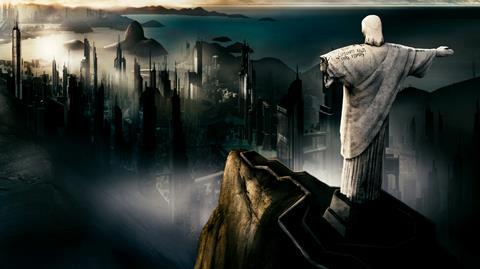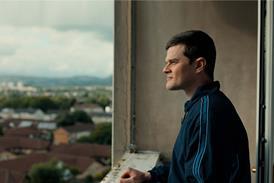Dir/scr: Luiz Bolognesi. Brazil. 2012. 75mins

A bold and striking adult animated film that traverses 600 years of Brazilian history – past and future – the ambitious Rio 2096: A Story Of Love And Fury fuses old-fashioned animation style with computer work and comes up with a film that blends legend with politics, finding plenty of room of sex, violence and mythology as it freewheels through the centuries.
The animation is relatively straightforward with the faces simply designed, but there are some striking backgrounds, especially when it comes the futuristic section of the film.
Closer to the multi-stranded generational hopping storyline of Cloud Atlas than usual traditional animated fare, but at the same time resisting the futuristic flourishes of anime, Luiz Bolognesi’s film is aimed very much at Brazilian’s as it dwells on dark moments from the country’s past. The film screened at the Rio Film Festival. Re-voiced it could easily be a seller around the world.
The film opens in the future, where a man and woman stand atop a gleaming skyscraper in the middle of the night, targeted by militia forces. The male character (voiced by Mello) stares out into the night and simply says: “To live without knowing the past is to walk in the dark”, and then switches back in time almost 600 years to 1566.
“I was born when Brazil was the name of a tree,” says the man, who says his name was Abeguar and he was a Tupinamba Indian. Following the village ritual of manhood he stalks a jaguar, but is surprised by Janaina (voiced by Pitanga) with whom he is deeply in love. To escape a wild animal they are forced to leap (she climbs on his back) from a cliff…they survive a massive fall, and the village shaman claims Abeguar has been given a mission by the Gods to lead his people and that he will ‘fly’ again when the time is right.
He is told he will have to struggle against an evil called Anhanga (Anhanga is the devil of the Amazon Indians of Brazil. According to the myth, Anhanga is a formless shape-shifter who can assume many identities to deceive and torment humans).
The tribe joins forces with the French to kill (and eat) Portuguese settlers, but the Portuguese retaliate in force, decimate the local population and build a new village they call Rio de Janeiro where the tribe lived. When Janaina is killed he is distraught and decides to jump from a mountain – but he doesn’t die, and is transformed into a bird.
He flies for 200 years before finding Janaina again, in 1825 living in a northern Brazilian forest in the body of another woman. Now calling himself Manuel Balaio the couple have two children, but despite being happy they are drawn into a rebellion against slave owners, but once again the rebels are put down by Portuguese military, and with his wife and daughters sold into slavery he turns into a bird again.
Next port of call is Rio of 1968 where he again finds Janaina who is part of the student rebellions against the military dictatorship. They are caught and tortured. Once again he turns into a bird and flies on until Rio of 2096 – flying cars, tower blocks, militia running the city and Christ the Redeemer still looking over the city, but with one arm broken off and covered in graffiti – where he finds Janaina as a singer in a futuristic bar.
Once again they rebel, and the film wraps atop a skyscraper (from the opening scene) where they are pinned down by militia. Once again she climbs onto his back and they leap from the building…
The animation is relatively straightforward with the faces simply designed, but there are some striking backgrounds, especially when it comes the futuristic section of the film. The film is adult at times - there is a little sex and more than a little violence - and intent on dealing with inicidents of oppression and cruelty through Brazilian history.
Production companies: Buriti Filmes, Gullane, Europa Filmes, Lightstar Studios, Mondo Cane Filmes, Estudio Luno, HBO
Producers: Caio Gullane, Fabiano Gullane
Co-producers: Lais Bodanzky, Luiz Bolognesi, Marcos Barreto
Associate producers: Selton Mello, Patrick Siaretta
Cinematography: Anna Caiado, Daniel Greco
Editor: Helena Maura
Art direction: Anna Caido
Music: Rica Amabis, Tejo Damasceno, Pupillo
Main cast: (voices) Selton Mello, Camila Pitanga, Rodrigo Santoro, Marcos Cesana, Bemvindo Sequeira, Sergio Moreno















![[Clockwise from top left]: Paul Thomas Anderson, Chloe Zhao, Ryan Coogler, Park Chan-wook](https://d1nslcd7m2225b.cloudfront.net/Pictures/274x183/9/0/0/1467900_writerdirectors_192733.jpg)




